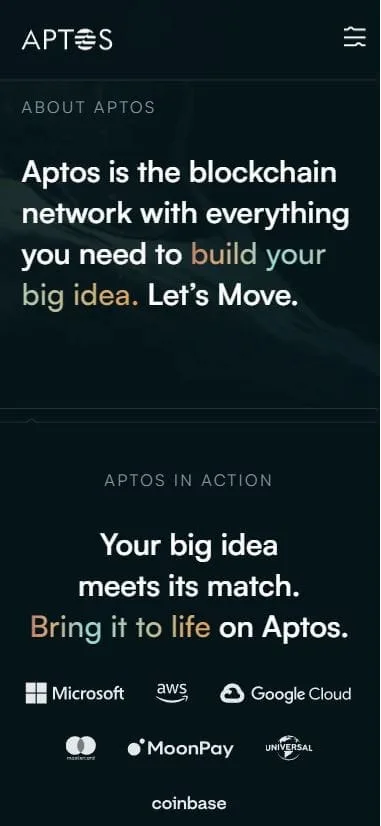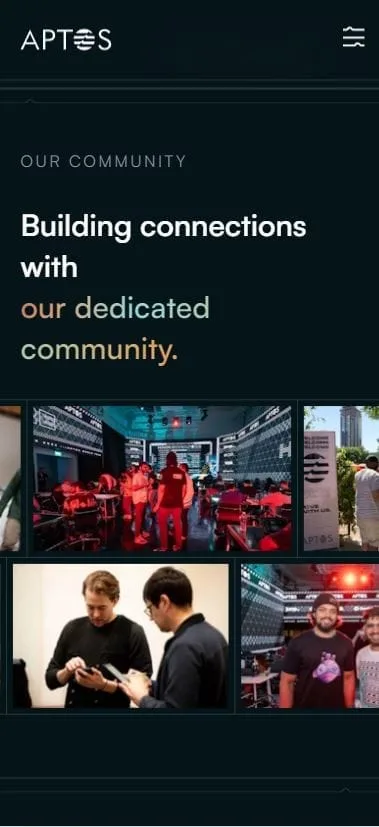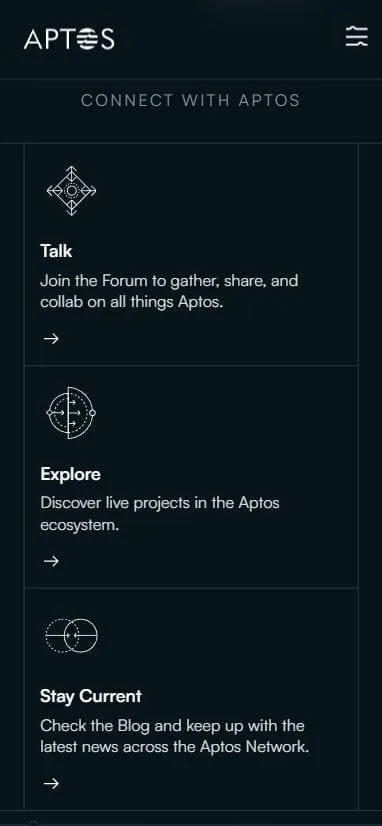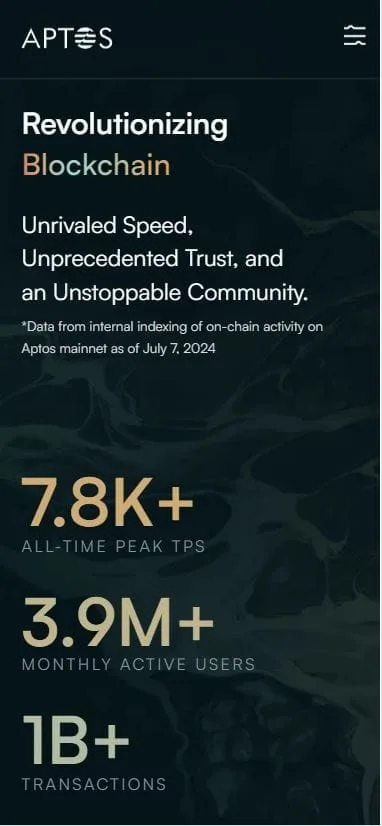Overview of Aptos (APT)
Aptos (APT) is a layer-1 blockchain designed to provide high scalability, security, and decentralization for decentralized applications (dApps) and digital assets. It was created with the aim of improving the current blockchain landscape by solving common problems like transaction speed, scalability, and security that other blockchains face. Aptos’ blockchain is specifically optimized for Web 3.0, the next phase of the internet, which includes decentralized finance (DeFi), NFTs, and Play-to-Earn (P2E) games.
Aptos was officially launched in October 2022, with its mainnet going live on October 17, 2022. It operates on the Proof of Stake (PoS) consensus mechanism, which ensures faster transactions and better scalability compared to Proof of Work (PoW) systems like Bitcoin. The blockchain uses a unique programming language called Move, which was initially developed at Facebook’s Libra project (now Diem), ensuring efficient, secure, and customizable smart contract execution.

Key Features of Aptos
1. Move Programming Language
- Move is a key innovation behind Aptos. It is a programming language designed for high-performance execution of smart contracts. Move is optimized for safety, security, and speed. It enables smart contracts to run with minimal errors and more predictable performance, which is important for the growing needs of decentralized applications in the Web 3.0 space.
2. High Throughput and Parallel Transactions
- Aptos has been designed with parallel transaction processing. This allows the network to process many transactions at once, significantly improving throughput compared to other blockchains that process transactions sequentially. This capability makes Aptos ideal for high-demand applications that need fast and scalable solutions.
3. Blockchain Trilemma Solution
- One of the key challenges that many blockchains face is the blockchain trilemma, which refers to the difficulty of achieving three key goals simultaneously: decentralization, security, and scalability. Aptos aims to address these challenges by offering a blockchain that delivers high scalability without sacrificing decentralization or security.
4. Validator Reputation System
- Aptos introduces a reputation system for validators. Validators are responsible for processing transactions and creating blocks. Their reputation is tracked, and validators with better reputations are incentivized to participate more actively in the network. This system helps ensure that the blockchain is secured by high-quality nodes, which further enhances the reliability of the network.
5. Decentralized Applications (dApps) and Smart Contracts
- Aptos enables developers to build decentralized applications (dApps) using Move. The blockchain is designed to support a wide range of use cases, including DeFi, NFTs, and Play-to-Earn (P2E) games. Smart contracts on Aptos are executed quickly and securely, which makes it a viable platform for developers looking for high-performance blockchain solutions.
APT Token: The Utility and Governance Token
The APT token is the native cryptocurrency of the Aptos blockchain. It serves several purposes within the network:
- Transaction Fees: APT is used to pay for transaction fees on the network. Every transaction that takes place on Aptos requires a small amount of APT to be paid as a fee, similar to how Ethereum uses ETH for gas fees.
- Staking and Validator Rewards: Validators can stake APT tokens to participate in the consensus mechanism of the network. Staking APT helps secure the network and ensures that validators are incentivized to act honestly. Validators who participate in block creation and transaction validation are rewarded with additional APT tokens.
- Governance: APT token holders have a role in the governance of the network. They can vote on proposals regarding protocol upgrades, changes to the system, or network upgrades. The token allows users to participate in decision-making processes that influence the future of Aptos.
- Security and Decentralization: The security and decentralization of the Aptos network are maintained through the staking mechanism. By requiring validators to stake APT tokens, Aptos ensures that malicious actors must put up a financial stake in the network to participate in validation, making it costly for them to attempt fraudulent activity.

Tokenomics of Aptos (APT)
Aptos has a total token supply of 1,000,000,000 APT tokens, which will be distributed over time. The breakdown of the token distribution is as follows:
- 51.02% for the community: This portion is allocated for various community programs, staking rewards, and ecosystem incentives.
- 19% for the team, consultants, and private investors: A significant portion of tokens is allocated to the core team, strategic consultants, and private investors who helped fund the development of Aptos.
- 16.5% for the foundation: These tokens are reserved for the Aptos Foundation, which is responsible for supporting the long-term growth of the ecosystem.
- 13.48% for investors: This portion is allocated to investors who participated in various funding rounds.
At the launch of the mainnet in October 2022, around 130 million APT tokens were in circulation, and the circulating supply will increase over time as more tokens are distributed to the community, developers, and validators.
Aptos vs. Competitors
Aptos competes with several other layer-1 blockchains and scaling solutions, including:
- Ethereum (ETH): Ethereum is the most well-known platform for decentralized applications, but it faces challenges with scalability and high transaction fees.
- Solana (SOL): Solana offers high throughput and fast transactions but has faced network outages, raising concerns about its decentralization and reliability.
- Cardano (ADA): Cardano is another layer-1 blockchain focused on scalability and security, but it has been criticized for slower adoption and ecosystem development compared to competitors like Ethereum and Solana.
- Avalanche (AVAX): Avalanche is known for its high scalability and low fees but is still competing for developer adoption and broader ecosystem growth.
- Polygon (MATIC): A Layer 2 scaling solution for Ethereum, Polygon aims to improve scalability while retaining Ethereum’s security, but it still depends on Ethereum’s infrastructure.
Storing Aptos (APT)
APT tokens can be securely stored in various cryptocurrency wallets:
- Coinmerce Wallet: If you purchase APT through Coinmerce, you can store your tokens in the platform’s wallet, which provides cold storage for added security.
- Hardware Wallets: For enhanced security, you can store APT in external hardware wallets like Ledger or Trezor. Make sure to verify the wallet address with Coinmerce to ensure the safe transfer of tokens.
Aptos (APT) is a high-performance blockchain platform focused on enabling the next generation of decentralized applications (dApps) and Web 3.0 services. With its innovative use of the Move programming language, parallel transaction processing, and a unique validator reputation system, Aptos aims to overcome the common limitations faced by other blockchains, such as scalability, security, and decentralization.
Aptos is positioned to be a key player in the Web 3.0 ecosystem, offering developers the tools needed to build fast, secure, and cost-effective dApps. With a solid team behind it, a growing ecosystem, and a focus on performance and scalability, Aptos is expected to compete strongly against other layer-1 blockchains, and its APT token plays a central role in powering the network and its governance.
























Harran –
Good
Robert Richards –
Good !